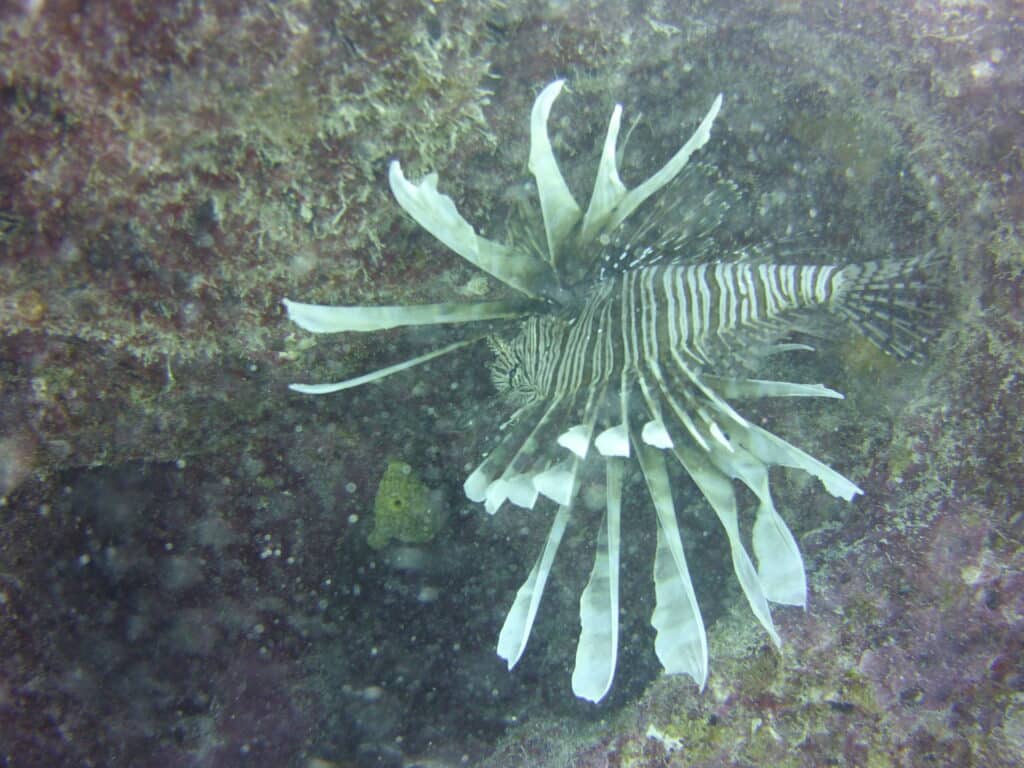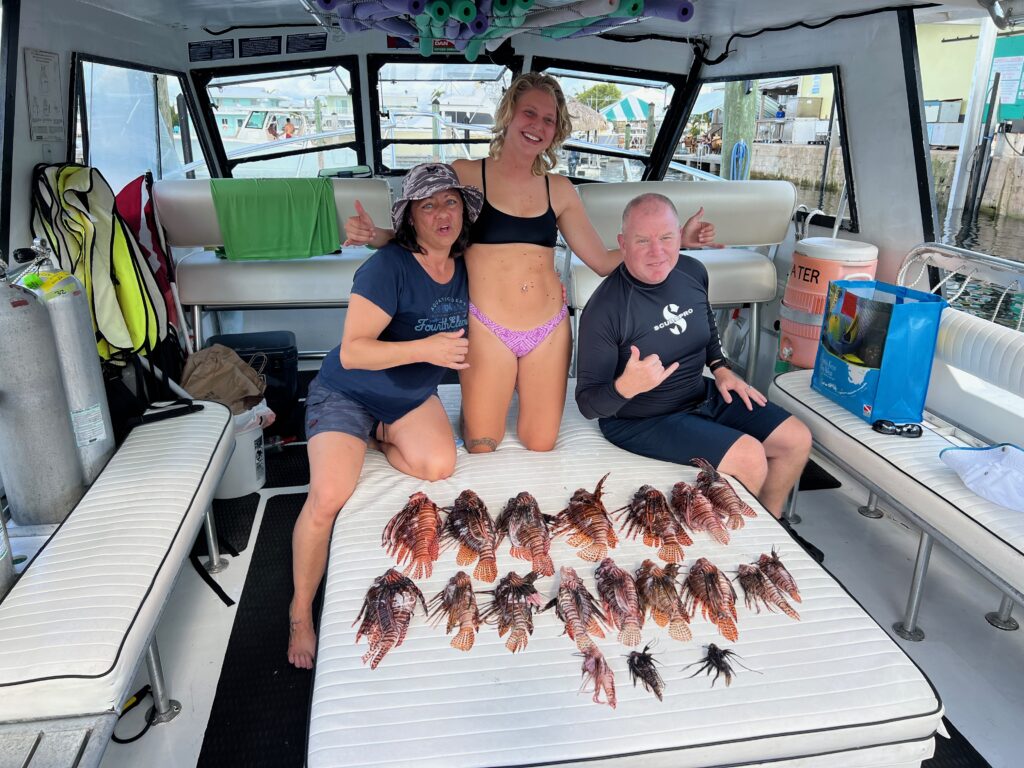Keeping the reef clear of invasive predators: Lionfish Hunting Key Largo

Lion fish hunting Key Largo is allowed in most areas on the Key Largo reef other than the Sanctuary Protection Areas (SPA)
An invasive species Lion fish can decimate a reef of its native fish life. Experts at Reef Environmental Education Foundation (REEF) do not believe that we will ever remove these fish from our waters but we sure are up for getting the numbers reduced!
“The invasion of lionfish (Pterois miles and Pterois volitans) may prove to be one of the greatest threats of this century to warm temperate and tropical Atlantic reefs and associated habitats. As the first marine reef fish invasive species to this region, lionfish are changing the culture of how reef managers view invasive species, the regional connectivity of marine reefs, and their vulnerability to marine invasions” – Dr. James A. Morris, Jr. NOAA
Some Amazing Lion fish Facts
Since 1985 the population of Lion Fish has grown massively see this interactive invasion timeline showing the spread of Lionfish starting in Miami and spreading through Florida and the Caribbean. The invasion of lionfish in Miami is largely attributed to the release from aquariums in Miami
Lionfish can live for unto 30 years
They inhabit all depths from the shore line to 1000 feet deep
There can be unto 200 lion fish in the area of a football field
On reefs where there are a lot of lion fish they can reduce the native population by 90%
One adult lion fish can consume up to 60 native fish a day
They start reproducing in less than a year and spawn unto 50000 eggs every 4 days all year round
Larval duration is less than a month
An adult lion Fish can produce up to 2 million baby lion fish per year
Baby Lion Fish start hunting and consuming native reef fish after 3 days
The largest record lionfish measured a little over 47.7cm or 19.5 inches and was speared near Islamorada, Florida in the United States
Lionfish like to be in a structure during the day and come out to hunt at dawn and dusk. This is the reason we don’t see many during the day unless we are on the lookout for them
When Lionfish hunt they blow water over their prey to disorientate them!
Lionfish hunting equipment
You can hunt for Lionfish by Snorkeling or by SCUBA diving. For those who are not SCUBA certified they can still join in the fun by snorkeling!
Hunting by SCUBA
As well as normal SCUBA gear you will also need
Gloves
Its important to protect your hands from the 18 venomous spins located on a lion fish. If you get stabbed by one of these it will be painful! The Gloves required will be stab proof as opposed to cut proof gloves. Think of cut proof gloves being made of chainmail, they are good for stopping a blade slicing on top of them but would let the lionfish spikes go through. Gloves that are designed to stop spikes are of a fine mesh construction, usually kevlar that is layered to close off any penetration holes. This material will give way to the spikes but not let it enter.
Nets
You can use both closed plastic nets like those used to collect live fish from the reef or open nets like those used to catch lobsters. Although using the open type nets are a little more difficult to use as they do not contain all of the linfish and the spines can poke out and get you. Open nets are better for snorkelers as they are not so heary to bring to the surface.
Pole Spear
Spears that are specifically designed for catch Lionfish can be used in the marine sanctuary main areas. These tend not to kill the Lionfish and can also attract predators whereas the closed nets do not. These spears are designed with a foldable barb on the end to stop them from coming off.
Hawian Sling
These are powered by a large rubber band and usually have a 3 pronged paralyzer tip. These do tend to contain the Lionfish better that the pole spears.
Flashlight
You will need a small flashlight to look into the nooks and crannies because this is where they hide during the day. Remember to look up to the ceiling of the hole as they like to hang upside down like bats!
Slurp Gun
One of our favorites! Simply place the tube near the Lionfish and pull the handle towards you and the Lion fish will go in. Well thats the theory! Getting them stay in there is the challenge
Keeper
Once you have speared your Lionfish you will need to get it into something fairly quickly. Most of the keepers have a ‘throat’ that you pass the lionfish through and it gets trapped the other side. You can use an adapted 5 gallon bucket with cuts in the lid. We have seen the water cooler tower container being used too. You can also buy purpose built lionfish Zookeepers specifically made for the job.
Hot Water
Its always a good idea to have hot, not boiling, water on the boat just in case you do get struck in the hand. if you put your hand in it you will get relief from the pain. We keep ours in a small 1 gallon cooler. You can also use a hot compress thats activated by breaking it up in the bag its in and placing it on the affected area these can be purchase online from the zookeeper website from the link below.
10% off Lionfish hunting gear!
If you are looking to purchase Lionfish hunting gear head over to our friends at Zookeeper who will give you a 10% discount on all gear with our COUPON ‘islandventures’
Lionfish Apparel
If you are looking for some lion fish themed apparel you could check out our partners waterlust.com This environmentally focussed company has many designs. Every purchase from this collection donates 10% of profits to Reef Environmental Education Foundation (REEF) and advocates for invasive lion fish removal
Permits Required
Lionfish hunting in the Florida Keys Marine Sanctuary does not require a special permit where fishing is normally allowed.
You will need a Permit to catch Lion fish in the Sanctuary Preservation Areas. See this article in Keys weekly for permits.
Hand nets or slurp guns only, no Spearguns or pole spears within the Sanctuary area.
We also have areas outside the Sanctuary where pole spears are allowed.
In all cases you should attend a Lion fish safe handling and collection workshop with Reef Environmental Education Foundation (REEF).
Lionfish Derbies

Reef.org has organized yearly Lion fish Hunting derbies where teams compete to get the most, biggest and smallest Lion fish. If you would like to take place in these derbies we are able to take you on our boat. Call us for details!
Lion fish Hunting Trips
Exclusive Lion fish hunting trips for groups who want to help clear the reef of Lion fish as well!
Trips are full boat charters only and are $599 for half a day plus tanks at $6 per tank(min 2). you can bring up to 10 divers and we will go to 2 locations for up to an hour at each location. Alternatively, if you have the training and skills we can hot drop you with a surface maker bouy and you can free hunt lionfish as a group.
All you need to do is make a reservation for a SCUBA boat charter and make sure we know you want to go hunting Lion fish before you arrive!
The boat will take you to places that we have either found Lion fish previously or where we have had recent reports of lion fish sightings.
Our recent experience (2023) is that they are found either in deeper water over 50 feet or in shallow water around 10 feet.
Remember that Lion fish have no natural predator in our waters and if we do not help clear them they will over run the reefs
Check out this brief from Reef Environmental Education Foundation (REEF) results of the September 2023 Derby which saw over 2000 Lion fish removed from the reef.
Make a date for Lionfish Hunting in 2024
This yearsReef Environmental Education Foundation (REEF) Lionfish Hunting derby in Key Largo is August 15 to 18. Head over to their website to sign up for this event, bring your own team and have your own boat with us!
Lionfish Hunting License Requirements
Fishing license is not required for recreational fishers targeting lion fish while using a device that is specifically designed and marketed exclusively for Lion fish.
How to do Lionfish Hunting
Lionfish are present in almost all of the reefs in Key Largo.
Catching Lionfish is a skill that has to be learnt for both success and safety. Here is a LINK to video tutorials on catching and cleaning lion fish.
They mainly active during the twilight hours so we see more during those times. During the day they like to be undercover and we often find them hanging upside down in the small holes and mini caves in the reef, and if disturbed will move further into the hole making them more challenging to get.
If you are fortunate you will see them out in the open you can take your time and insure that you get a good headshot so as not to damage the flesh.
Here is a really great article by Andy Lowe on his experience in hunting Lionfish!
As with all of our underwater activities please remember this is first and foremost a scuba dive. You should ensure that you are following all of the diving rules regarding, depth, air consumption, overhead environments and surfacing.
Rental equipment
As always we can provide SCUBA rental gear. Lion fish hunting specific equipment can be purchased at the shop such as nets and pole spears.
And Finally…
Here is an interesting article from NOAA about deep water traps for Lion fish.
